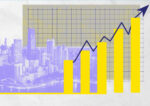Efforts to lift the state’s ban on rent control in the Illinois General Assembly have stalled for now, as bills introduced fail to gain traction. The push to fund a $20 million state affordable housing tax credit, however, was successful.
An Illinois Senate bill to lift the rent control ban, introduced in February by state Sen. Natalie Toro of Chicago’s 20th District, is on ice after it was not called in time to meet a legislative deadline.
The bill was not assigned to a committee before April 12, meaning it will not move forward this session, Toro’s spokesperson, Natalie Bak, said in an interview shortly before the deadline. It could still move forward if it is called in one of the body’s special sessions or resurrected in the fall.
Toro was not available for comment Monday, but said in a written statement that the bill continues to await assignment to committee.
“Fifty percent of renters in my city are paying more than 30 percent of their income in rent, leaving little leftover for other essential expenses,” Toro said in an Illinois Senate Democrats news release from February. “We need to fight to keep families in their homes, and I look forward to spearheading the initiative to do so.”
Toro’s bill, SB3484, seeks to repeal the Illinois Rent Control Preemption Act, passed in 1997 to prohibit municipalities from enacting measures that exert control over the amount of rent charged to tenants in their area.
A similar bill (HB4104) introduced in February in the Illinois House of Representatives garnered the support of 14 sponsors but has also lacked momentum, stalling in the body’s Rules Committee.
The Build Illinois Homes Tax Credit Act, on the other hand, was approved by the state Senate and the House last week, setting aside funds for a $20 million state affordable housing tax credit in the upcoming budget, according to reporting by Capitol News Illinois.
The Act, passed through HB4909 and SB3233, is modeled after the federal Low-Income Housing Tax Credit and follows an unsuccessful bid from last year to appropriate $35 million in affordable housing tax credits.
Meanwhile, efforts to repeal the state’s rent control ban continue to fizzle out despite years of grassroots lobbying by organizers such as those with the Lift the Ban Coalition, formed in 2017.
Lift the Ban organizers point to the real estate lobby as its biggest adversary in the push to repeal the ban, according to an FAQ page on its website. Lobbying by the American Legislative Exchange Council, a conservative lobbying group, and lobbyists with the real estate industry got the rent control ban passed in 1997, the page states.
When asked about current legislative efforts to lift the rent control ban, a spokesperson for Illinois Realtors said its most recent lobbying work in Springfield has been focused elsewhere. Its governmental affairs team contacted Toro regarding her bill, and she told them she would not be calling it at this time.
Read more


